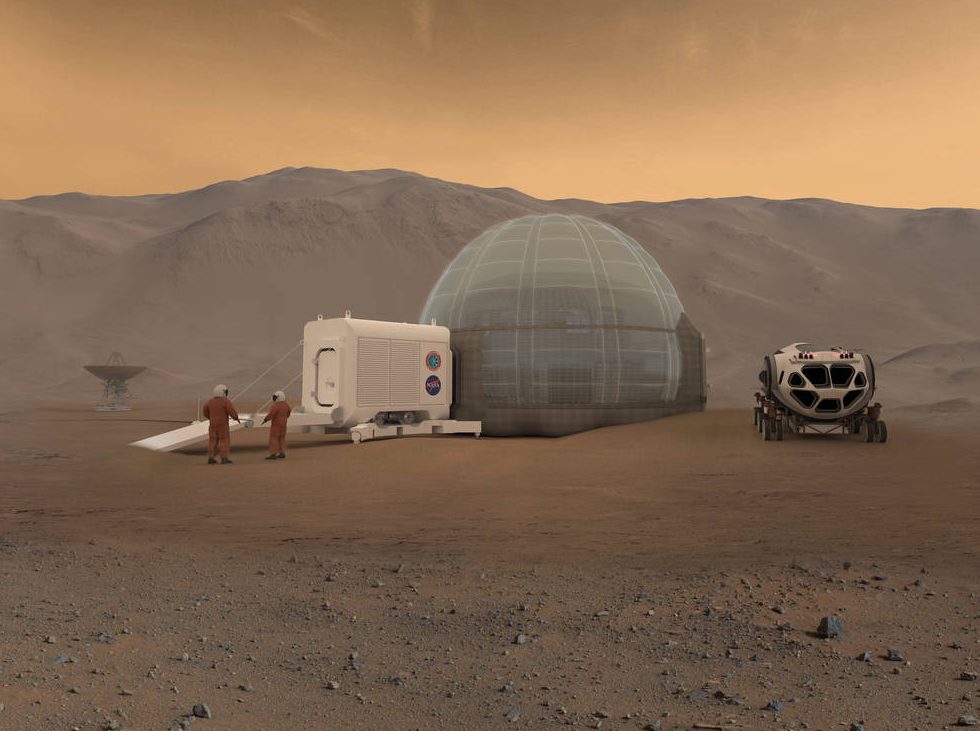
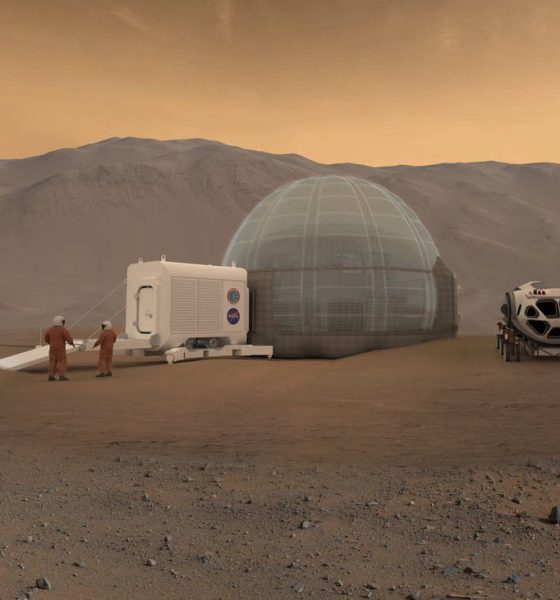
News
Scientists create ‘living concrete’ that could one day be used on Mars
Builders have been making concrete the same way for hundreds of years: by mixing sand with various binding materials.
However, a team of researchers at the University of Colorado, Boulder has a different approach. They’re making a new kind of concrete, one that is alive and can even replicate itself.
It’s made using a common type of microbe: cyanobacteria. This type of organism gets its energy through photosynthesis.
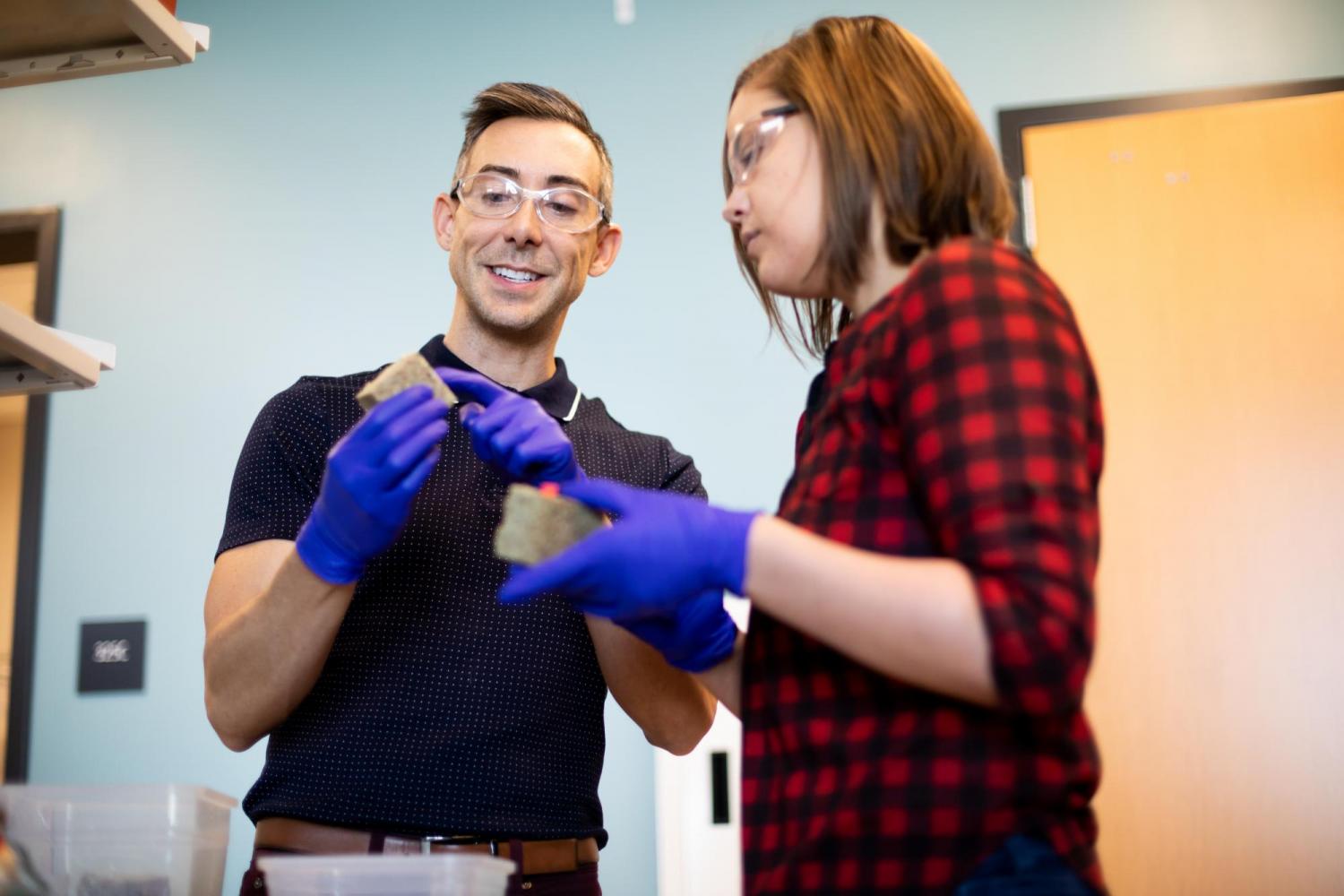
The field of synthetic biology is booming with researchers exploring new ways to build and new materials to work with. Recently, a different team has proposed the use of mycelium as another type of building material.
A major advantage of this new type of concrete is that it can heal itself, repairing any cracks that may appear.
The new concrete type was recently detailed in the journal Matter. “We already use biological materials in our buildings, like wood, but those materials are no longer alive,” Wil Srubar, an assistant professor in the Department of Civil, Environmental and Architectural Engineering (CEAE) said in a news statement. “We’re asking: Why can’t we keep them alive and have that biology do something beneficial, too?”
So how did the group build this new type of living concrete? First, the researchers tried putting the cyanobacteria in a mixture containing warm water, sand, and other nutrients. The microbes began producing calcium carbonate and gradually cemented the sand particles together.
But the process was extremely slow — too slow in fact for the project’s funder, Darpa, the Department of Defense’s research offshoot.
The team switched its focus to gelatin, a food ingredient that once dissolved in water and cooled, created special bonds between its molecules. The team decided to try adding gelatin to the bacteria mixture.
Success! The gelatin not only provided more structure, but also worked with the bacteria and the result was faster-growing, living concrete. It took about a day for the bacteria to form concrete blocks, and although it was weaker than conventional concrete, it was sturdy enough for a person to stand on.
Blocks ranged in size from two-inch cubes to shoebox-sized to larger truss pieces. When stored in relatively dry air and at room temperature, it takes a few days for the blocks to reach their maximum strength. The bacteria can survive for several weeks and even be rejuvenated – resulting in further growth. Under the right conditions, of course.
“We know that bacteria grow at an exponential rate,” Srubar said. “That’s different than how we, say, 3D-print a block or cast a brick. If we can grow our materials biologically, then we can manufacture at an exponential scale.”
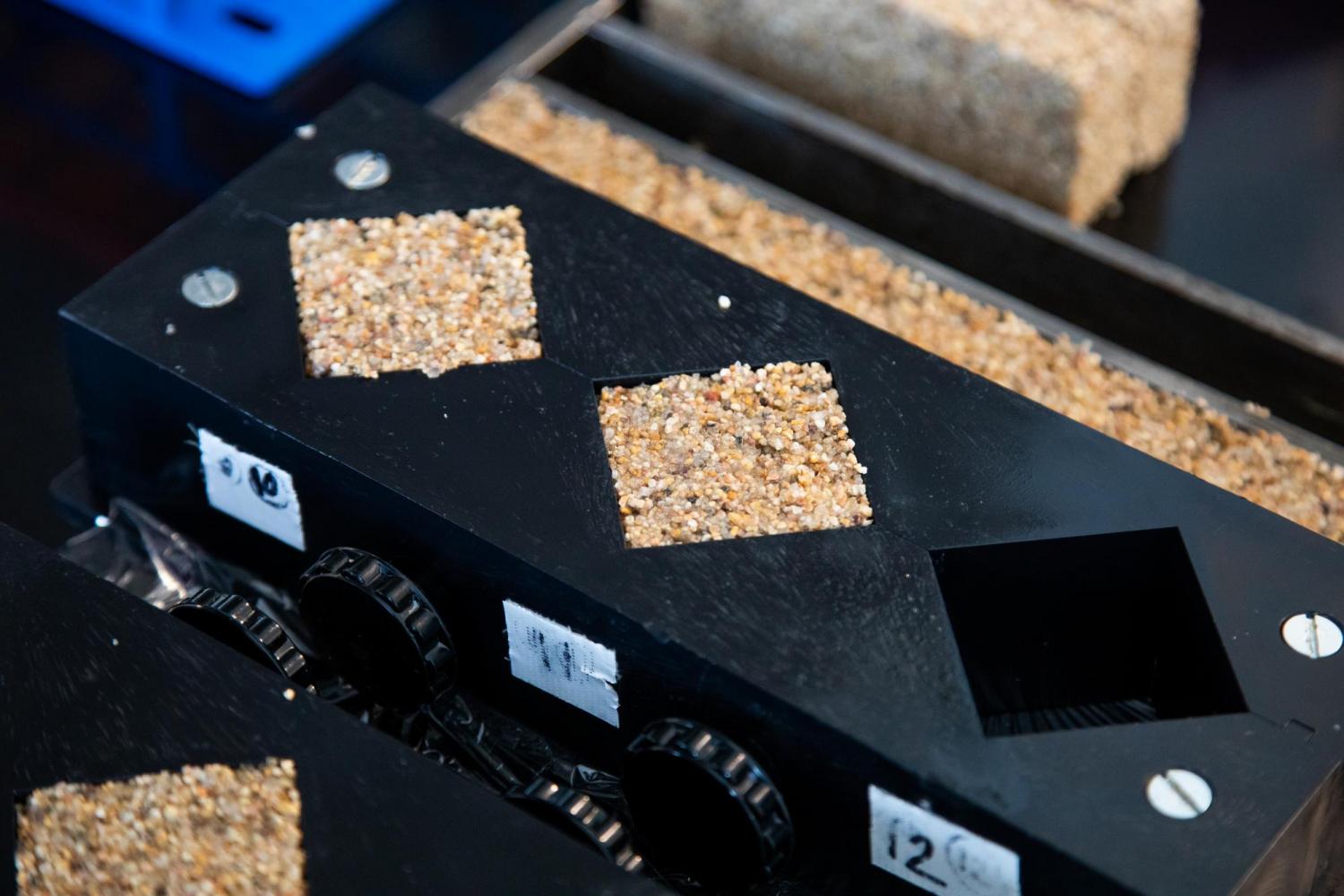
DARPA is extremely interested in this research and in self-growing material in general. That’s because it can be used to build structures in remote and inhospitable areas such as the desert or even outer space.
If the living concrete can prove to be scalable, that would reduce the number of materials that we will need to launch, which is a huge deal when even pound counts.
It’s much easier to bring biology with us than to carry bulky building materials to space. Perhaps the first humans on Mars will live in habitats fashioned out of cyanobacteria concrete bricks, or even mushrooms.
“Nature has figured out how to do a lot of things in a clever and efficient way,” Srubar said. “In austere environments, these materials would perform especially well because they use light from the sun to grow and proliferate with very little exogenous material needed for their growth,” added Srubar. “It’s going to happen one way or another, and we’re not going to be trucking bags of cement all the way to Mars. I really do think that we’ll be bringing biology with us once we go.”

News
Tesla rolls out new Supercharging safety feature in the U.S.
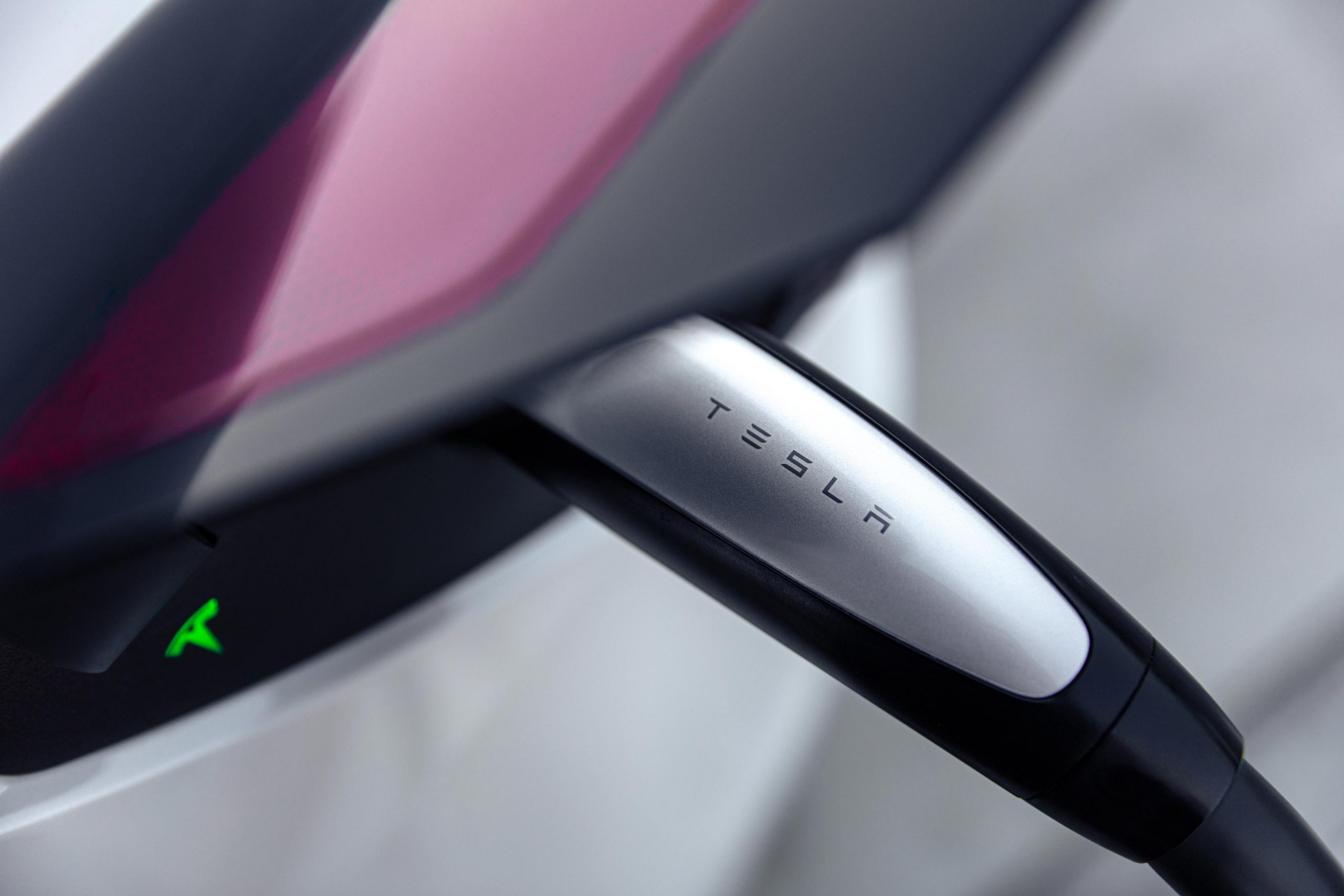
Tesla has rolled out a new Supercharging safety feature in the United States, one that will answer concerns that some owners may have if they need to leave in a pinch.
It is also a suitable alternative for non-Tesla chargers, like third-party options that feature J1772 or CCS to NACS adapters.
The feature has been available in Europe for some time, but it is now rolling out to Model 3 and Model Y owners in the U.S.
With Software Update 2026.2.3, Tesla is launching the Unlatching Charge Cable function, which will now utilize the left rear door handle to release the charging cable from the port. The release notes state:
“Charging can now be stopped and the charge cable released by pulling and holding the rear left door handle for three seconds, provided the vehicle is unlocked, and a recognized key is nearby. This is especially useful when the charge cable doesn’t have an unlatch button. You can still release the cable using the vehicle touchscreen or the Tesla app.”
The feature was first spotted by Not a Tesla App.
This is an especially nice feature for those who commonly charge at third-party locations that utilize plugs that are not NACS, which is the Tesla standard.
For example, after plugging into a J1772 charger, you will still be required to unlock the port through the touchscreen, which is a minor inconvenience, but an inconvenience nonetheless.
Additionally, it could be viewed as a safety feature, especially if you’re in need of unlocking the charger from your car in a pinch. Simply holding open the handle on the rear driver’s door will now unhatch the port from the car, allowing you to pull it out and place it back in its housing.
This feature is currently only available on the Model 3 and Model Y, so Model S, Model X, and Cybertruck owners will have to wait for a different solution to this particular feature.
News
LG Energy Solution pursuing battery deal for Tesla Optimus, other humanoid robots: report
Optimus is expected to be one of Tesla’s most ambitious projects, with Elon Musk estimating that the humanoid robot could be the company’s most important product.
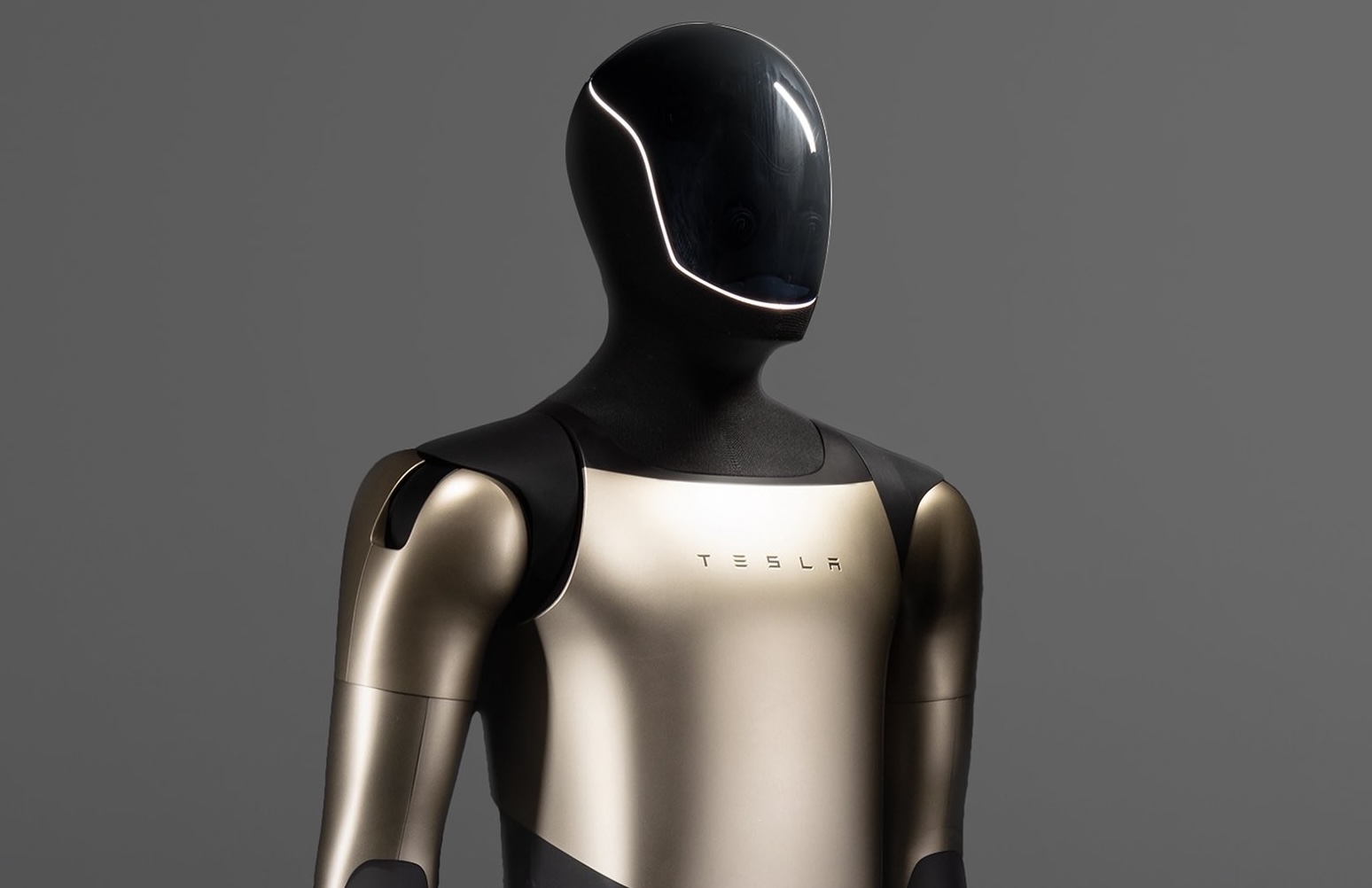
A recent report has suggested that LG Energy Solution is in discussions to supply batteries for Tesla’s Optimus humanoid robot.
Optimus is expected to be one of Tesla’s most ambitious projects, with Elon Musk estimating that the humanoid robot could be the company’s most important product.
Humanoid robot battery deals
LG Energy Solution shares jumped more than 11% on the 28th after a report from the Korea Economic Daily claimed that the company is pursuing battery supply and joint development agreements with several humanoid robot makers. These reportedly include Tesla, which is developing Optimus, as well as multiple Chinese robotics companies.
China is already home to several leading battery manufacturers, such as CATL and BYD, making the robot makers’ reported interest in LG Energy Solution quite interesting. Market participants interpreted the reported outreach as a signal that performance requirements for humanoid robots may favor battery chemistries developed by companies like LG.
LF Energy Solution vs rivals
According to the report, energy density is believed to be the primary reason humanoid robot developers are evaluating LG Energy Solution’s batteries. Unlike electric vehicles, humanoid robots have significantly less space available for battery packs while requiring substantial power to operate dozens of joint motors and onboard artificial intelligence processors.
LG Energy Solution’s ternary lithium batteries offer higher energy density compared with rivals’ lithium iron phosphate (LFP) batteries, which are widely used by Chinese EV manufacturers. That advantage could prove critical for humanoid robots, where runtime, weight, and compact packaging are key design constraints.
News
Tesla receives approval for FSD Supervised tests in Sweden
Tesla confirmed that it has been granted permission to test FSD Supervised vehicles across Sweden in a press release.

Tesla has received regulatory approval to begin tests of its Full Self-Driving Supervised system on public roads in Sweden, a notable step in the company’s efforts to secure FSD approval for the wider European market.
FSD Supervised testing in Sweden
Tesla confirmed that it has been granted permission to test FSD Supervised vehicles across Sweden following cooperation with national authorities and local municipalities. The approval covers the Swedish Transport Administration’s entire road network, as well as urban and highways in the Municipality of Nacka.
Tesla shared some insights into its recent FSD approvals in a press release. “The approval shows that cooperation between authorities, municipalities and businesses enables technological leaps and Nacka Municipality is the first to become part of the transport system of the future. The fact that the driving of the future is also being tested on Swedish roads is an important step in the development towards autonomy in real everyday traffic,” the company noted.
With approval secured for FSD tests, Tesla can now evaluate the system’s performance in diverse environments, including dense urban areas and high-speed roadways across Sweden, as noted in a report from Allt Om Elbil. Tesla highlighted that the continued development of advanced driver assistance systems is expected to pave the way for improved traffic safety, increased accessibility, and lower emissions, particularly in populated city centers.
Tesla FSD Supervised Europe rollout
FSD Supervised is already available to drivers in several global markets, including Australia, Canada, China, Mexico, New Zealand, and the United States. The system is capable of handling city and highway driving tasks such as steering, acceleration, braking, and lane changes, though it still requires drivers to supervise the vehicle’s operations.
Tesla has stated that FSD Supervised has accumulated extensive driving data from its existing markets. In Europe, however, deployment remains subject to regulatory approval, with Tesla currently awaiting clearance from relevant authorities.
The company reiterated that it expects to start rolling out FSD Supervised to European customers in early 2026, pending approvals. It would then be unsurprising if the company secures approvals for FSD tests in other European territories in the coming months.








